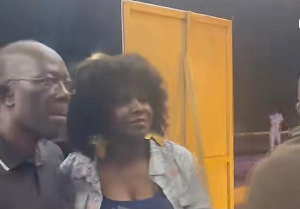- Home - News
- TWI News | TV
- Polls
- Year In Review
- News Archive
- Crime & Punishment
- Politics
- Regional
- Editorial
- Health
- Ghanaians Abroad
- Tabloid
- Africa
- Religion
- Election 2020
- Coronavirus
- News Videos | TV
- Photo Archives
- News Headlines
- Press Release
General News of Sunday, 26 October 2008
Source: GNA
Chief Justice joins in calls for peaceful, credible elections
Accra, Oct. 26, GNA - The Chief Justice (CJ), Her Lordship Mrs Georgina Theodora Wood, has added to the chorus of calls for peaceful and credible elections on 7 December, saying the anxiety as to whether things would work out well makes the voting a real test, following negative events in some African countries of late. "This has cast doubts as to the ability of the African to conduct clean and fair elections," she noted in an address she delivered at the 13th Ghana Journalists Association (GJA) Awards night, held on Saturday in Accra.
The event was under the theme: "Using the Media to Promote National Unity and Stability in an Election Year." The event was sponsored by corporate Ghana, including MTN and Unilever.
Mrs Wood said: "This is certainly not good enough. We, therefore, owe it to ourselves and to posterity, not only to prove the sceptics and cynics wrong, but also demonstrate convincingly, to the rest of the world that we in Ghana do walk the good governance and rule of law talk."
She said the deep suspicion and mistrust surrounding the elections and the potential of a real threat of post-election violence in particular placed on every well meaning Ghanaian a solemn and patriotic duty to proactively work towards free, fair, clean, transparent, credible and peaceful elections.
The Chief Justice said government and opposition parties had a role to play in achieving this objective.
"The role of our security agencies, particularly the police, is critical to this endeavour. The judiciary also has a pivotal role to play in the engagement, but so does the Electoral Commission, National Commission on Civic Education, other key state institutions and indeed, all Ghanaians."
Mrs Wood asked the media to promote the interest of the society and fundamental human rights and civil liberties of the people. "Friends, you must do all that will engender national peace and cohesion and not the other way round."
Mrs Wood reminded journalists that in the history of the media in Ghana, they have prospered only when the system of governance was democratic.
She pointed out that whenever there was an authoritarian system in place, whatever freedom was enjoyed at the beginning yielded its place to a culture of silence or censorship. Mrs Wood tasked the media to continue to remind those seeking the mandate of the people to govern their supporters and followers to desist from acts that could undermine the credibility of the electoral process and national peace.
She also stressed the need for the media to inform the public about competing political parties and their status-quo for the electorate to form their opinions and make wise political choices.
Mrs Wood charged the media not to allow personal preferences or animosity to "becloud your judgement" as fairness and objectivity was crucial that "we must not treat them lightly".
She emphasised that the deliberate manufacture of "outright wicked lies" against political opponents that tended to undermine institutional integrity, create animosity or destroy people's hard won integrity and the concocting of stories should be discouraged.
"Debating issues, not attacking personalities, ought to be at the centre of our discourse. We are not putting an intolerable burden on you by these demands."
Mrs Wood reminded the media that ethnicity was the worst threat to national peace and cohesion, thus, stories involving ethnic or religious groups should be handled with sensitivity. She encouraged the media to continue to urge the youth not to allow people to use them to cause havoc in the country, and to warn the public of the dangers of war and strife, whether ethnically or electoral driven.
"The good name and welfare of Ghana certainly overrides the parochial interest of power seekers. The world is not going to come crashing down because your political party did not win. We earnestly pray that no one misleads our people", Mrs Wood said. She said that to deepen democracy further, the judiciary was opening up to media to enable them understand judicial processes in order for them to pay their role as a communication medium and moderator of public debate.
Mrs Wood promised a strong communication department that would facilitate interaction between the Judiciary and the media, as well as the organisation of periodic courses in court reporting for media reports to be informative and authoritative.
She said that in conformity with the constitutional obligations of the Judiciary to deal with electoral disputes, provisions have been made for a number of automated courts across the country to deal with them on a day-to-day basis. Mrs Wood said there was the expectation that the judges selected to be on these courts would win the support of the people by their impartiality and fairness, adding that disputants would be given the option to choose the informal Alternative Dispute Resolution System that was fully operational as an adjunct to court room trial.










